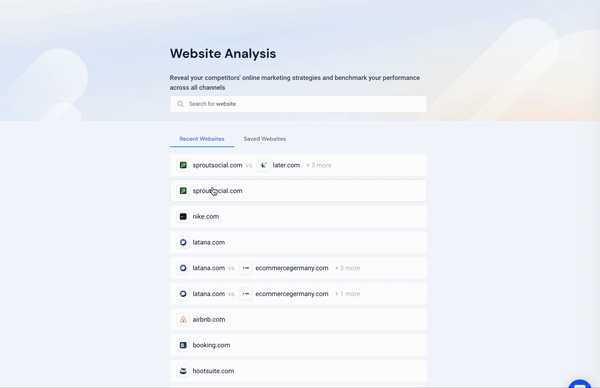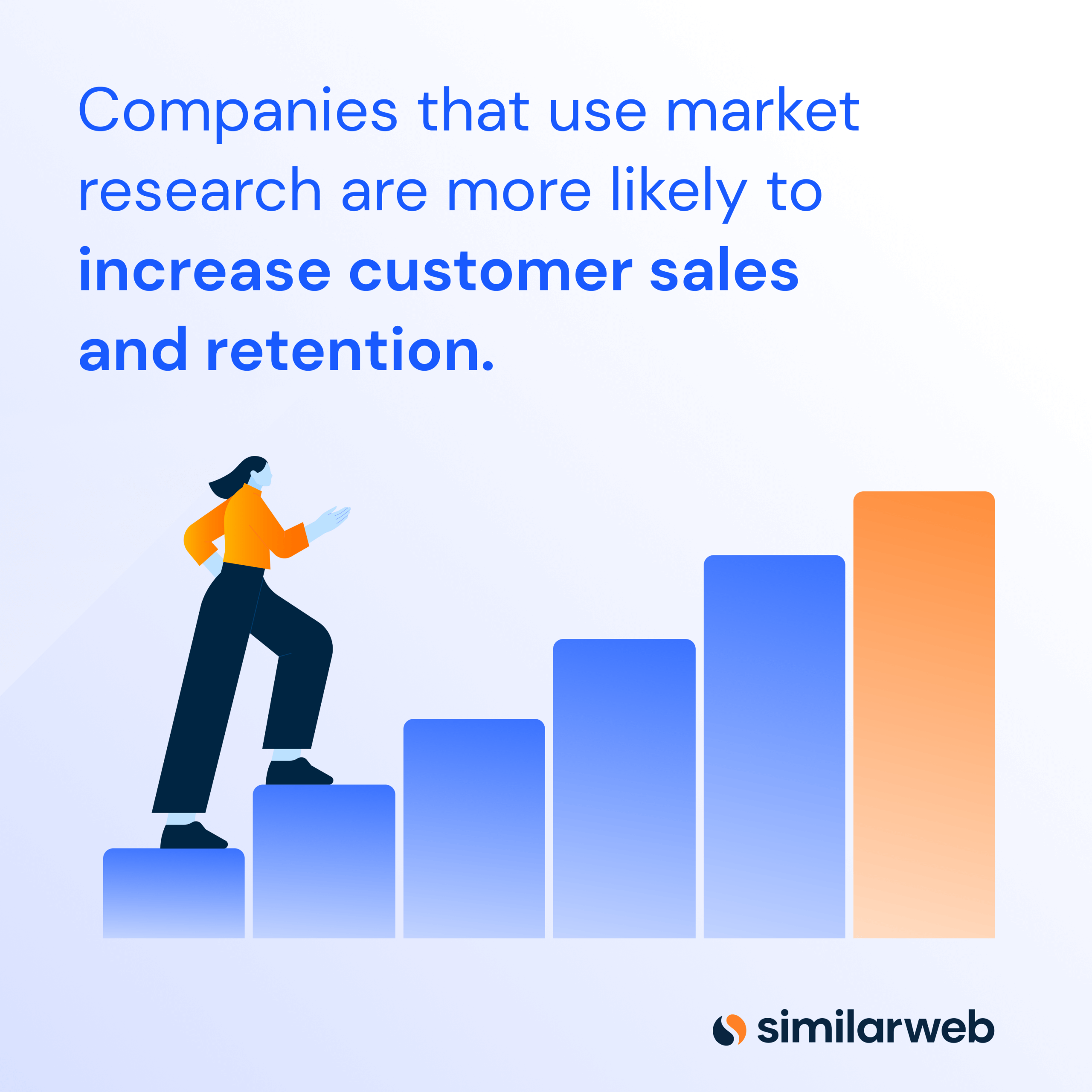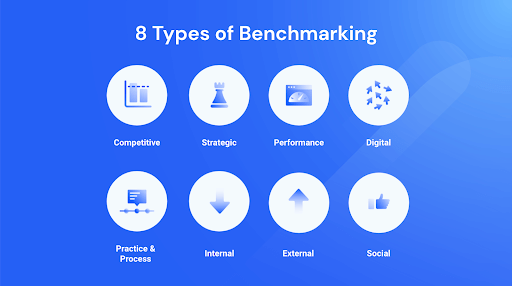 Research Intelligence
Research Intelligence
11 Benefits of Market Research + Free Templates

The benefits of market research are long-proven. Yet still, there are many who focus on instinct instead of insight.
While intuition is all good and well, there’s no getting away from the power of cold-hard data.
In this post, I list 11 market research benefits, with real-world examples and six free research templates thrown in for good measure.
1. Better communication with customers
Why it matters: Effective communication is the cornerstone of good relations. And, with how much time, effort, and money it takes to win a new client, ensuring you stay in their good books isn’t just nice – it’s a necessity.
The first benefit of market research is the ability to learn about your customer’s likes and dislikes – so you can adapt how you position the business and its products accordingly. Tailored communications speak to customers in a way that resonates far better than generalized messages.
The one-size-fits-all approach no longer works. Delivering comms in the right format, at the right time, via the right platform can boost engagement and help focus on driving value. With it, customers feel appreciated and receive information that’s both useful and relevant.
These days, all it takes is a quick click, and customers can unsubscribe from communications. This is why businesses must ensure every communication counts.
Example: Market research surveys are an ideal way to quickly understand how customers feel about your communications with them. Be direct, and ask them about the content, frequency, and formats they prefer.
If you want to establish the best time or day of the week to email, you can use your email campaign tracking data to show you the best and worst times, based on open rates, and click-through rates.
2. Enables strategic, data-driven plans
Why it matters: Market research benefits all types and stages of business planning. It gives you the numbers and insights you need to make accurate forecasts. It can also impact key decisions that can help you develop and adapt your strategy.
Here are a few examples where market research can benefit data-driven decision-making:
- Deciding whether to modify or discontinue a product.
- Prioritizing new features to develop for an existing product.
- Establishing which marketing channels to invest in.
- Selecting which social media platforms to utilize.
- Choosing which new markets to enter or where to open a new retail outlet.
- Evaluating the impact of a cost increase or change to pricing strategy.
- Discover new partners, affiliates, or publishers to work with.
- Targeting a new persona or different segment of a market.
Market research serves as a trusty compass, helping guide and steer decisions that impact growth and profitability. Once you implement a new tactic or campaign, you can again benefit from market research to measure and track ongoing success.
3. Develop detailed target personas
Why it matters: It’s no secret that a comprehensive understanding of one’s target audience is fundamental to an organization’s success. Everything from product development to positioning and marketing is impacted by the effective development of target personas.
While most companies have a decent understanding of what their ideal customer profile looks like; a distinct advantage of market research is the depth of detail it offers about the preferences, behaviors, and habits of a target audience – based on actual facts and everyday actions they take online.
By doing audience analysis and utilizing consumer journey tracking, organizations can discover insights about their ideal customers quickly and in finite detail. So instead of having a static persona that doesn’t really change with the times; marketers can discover things like:
- Age, gender, and geography
- Audience loyalty & interests
- Cross-shopping behaviors
- Product search trends
- View audience overlaps with rivals
- Identify drop-off points in funnels
- Optimize conversion funnels
- Discover which marketing channels appeal to a specific audience
Grab our customer persona template to use a framework for this research – it’s at the end of this post, along with 5 other useful market research templates!
4. Reduce costs and save time
Perhaps one of the biggest benefits of market research for a business is its ability to help organizations improve efficiency and reduce outlay – both from a time and cost perspective. While each business achieves different outcomes, doing proper research can help pave the way for process improvements.
A few examples include:
- Spending less on marketing channels that don’t appeal to a target audience or drive ROI.
- Decrease customer churn via surveys, enhanced support, or more suitable product offerings.
- Prevent you from entering a new market in a territory that’s already saturated.
- Testing the viability or appetite for a new product or service before making investment decisions.
- Reduce customer acquisition costs (CAC) through clearer targeting and messaging.
- Identification of new partnerships or affiliates who can drive referrals to your business.
DocSend uses Similarweb to reduce marketing spend by 20% and reduced research time by 10% – as an added bonus it saw website traffic gains of around 10%.
Read more about how market research benefited DocSend here.
5. Stay ahead of the competition
Why it matters: These days, the competition is fierce in almost every market. Customers have many options to choose from, and outpacing your rivals is a constant battle. From new product or service offerings to campaigns and content – not to mention promotions and partnerships; keeping a keen eye on your market positioning is key.
A core benefit of market research is knowing what other players in your market are doing. More to the point, market research actually shows you how well these offerings are doing.
A competitive analysis framework is a great way to systematically record and track what your rivals are doing. It can help you spot opportunities, such as:
- Develop new marketing campaigns and creatives
- Adapt your product or service offerings
- Give insights into new content to write about
- Show you which channels work best for your target market
- Find underserved segments of a market
- See what customers like or dislike about your rivals
- Help you develop your unique selling proposition (USP)
Good market research can be the differential factor that gives you an edge in your market.
In this scenario, I want to analyze the competitive landscape of a social media management company. I chose Sprout Social to review as it’s considered a market leader.
See how much competitive intel I can grab in less than a minute
In a snapshot, I can see an overview of its traffic and engagement. This includes the total visits, unique visitors, a link to its apps, and a breakdown of traffic by channel. With a quick comparison, I see how these metrics stack up against others in the market. Later.com and influencermarketinghub.com are two players who consistently outperform sproutsocial.com – which means I can delve deeper into their successes, campaigns, and content next.
From the platform, I can see how many referrals they’re getting, and from where. Which ad networks and campaigns they’re running, and copies of the creatives being used.
Next, I look at the most popular pages on Sprout Social’s site. This shows several pages on the topic of small business social media are achieving significant growth – indicating my target audience is responding to these pages, so I should be covering or promoting content on a similar theme.
So, in less than a minute, I’ve discovered
- How my competitor stacks up vs others in the market
- Which traffic channels are growing
- The best referral partners and advertisers
- What marketing channels are showing the best results
- Copies of their ad creatives
- What content topics are the most popular
- Top industry search terms
- Uncovered two other major players to evaluate
Software like Similarweb makes it quick and easy to see the insights and metrics that matter most. Here, you can discover where you can get a competitive edge, and keep track of market trends and rival campaigns.
6. Discover the best marketing channels
From email marketing to socials, affiliates, referrals, paid ads, and more; there are many marketing channels to leverage – and it’s not always obvious which is right for your business. Another key benefit of doing market research is the ability to hone in on the channels that deliver the best return on investment.
A trial-and-error approach can be costly. Not just from a dollar perspective, it can be a drain on your resources too. By first establishing the optimal marketing mix for your target audience or market, you can save time and money, and reach your goals faster.
Similarweb Digital Research Intelligence can show you which channels work best for your market and rivals. It also highlights the specific ad creatives and content being used for high-performing campaigns.
Here, you see a snapshot of the marketing channels being used across five competitive sites. It shows the biggest drivers of traffic are direct and organic search. By clicking on any single channel, you can get a complete breakdown of the respective details. I’ve clicked to expand social media, as just one example, here’s what it tells me.
As well as being able to instantly see the insights that count, I can click on any channel to see a detailed breakdown of performance. Next, I can compare each channel to see who is outperforming others – which tells me exactly who I need to take a closer look at.
7. Identify growth opportunities
The benefits of doing market research apply to those launching new products or entering new markets. However, periodic research can also help you spot growth-focused opportunities that may not have been considered before.
Another compelling entrant to include in the benefits of market research is its ability to unearth opportunities to grow. Whether that’s through finding new customers, markets, channels, or creative ways to go to market and get more eyes on your business. A good case in point is in the identification of new partnerships for referrals; something that often comes about when doing a competitive analysis.
The advantages of using market research for growth are ongoing, throughout the lifecycle of your business. For example:
- Reviewing competitor marketing channels could uncover key findings about a new affiliate site that’s sending a volume of traffic to their site.
- A guest post or piece of content generates a high level of interest and drives traffic to the site.
- Untapped segments for your products. Perhaps a rival is doing a better job of appealing to a different demographic. This, in turn, presents an opportunity to diversify your messaging or switch marketing channels. The same could apply to a new location or geographic region.
- New partnerships. Joint ventures between businesses that share a similar target demographic can be mutually beneficial – helping both parties reach a new ready-prepped customer base.
- Perhaps a rival is offering an add-on or upsell that you’ve failed to consider.
- You might also conduct market research surveys where customers tell you something they’d like but which you don’t yet offer.
8. Spot new or emerging trends
Why it matters: With how quickly consumer behaviors change and markets shift, it’s important to move with the times. Market research can help businesses stay in touch with what’s happening – something that applies to consumers, competitors, and the industry as a whole.
From changes to purchasing behaviors, new technologies, new products, or service features; researching trends and staying close to rising players in your market allows you to keep tabs on what things are attracting attention.
- Which keywords or phrases are trending in your industry?
- Is there a new player showing significant growth in your market?
- What are your rival’s highest-hitting pages?
- How are apps impacting your market – do you know which of your competitors have one, and is it successful?
- Which campaigns in your industry are working and gaining traction?
- Is there a specific asset, whitepaper, or offering that your target audience responds to?
- Are there any seasonal trends that impact your market?
- Can you see spikes in specific search terms or phrases?
While you can use digital research tools like Similarweb to quickly analyze a market, search trends, seasonal patterns, mobile app intelligence, and more – qualitative data, like surveys can be leveraged to understand customers and changing behaviors too.
9. Makes it easy to evaluate and track your success
Why it matters: With the knowledge of where your business is performing well, or falling behind, you can set goals and direction more clearly. Benchmarking shows you industry standards, and maps out how rivals are doing; so you can measure relative performance.
For a business to grow, it needs to push the boundaries. The benefit of using market research here is that it shows you where and how big those boundaries are. A survey from PWC found businesses that set benchmarks achieve 45% more productivity and grow, on average 69 times faster than those that do not.
There are various types of benchmarking – each of which makes it possible to unpack and track the successes of those in your market and drill down into what success looks like for your business.
10. Inform market analysis – SWOT
Why it matters: A further benefit of doing market research is that it can show you any relative strengths, weaknesses, opportunities, and threats that exist between competitors and in a market. Greater awareness of these facts helps drive the right actions and gives clarity on areas of focus for the business. Without it, your business is susceptible to preventable mistakes.
With company and market research, you find out where opportunities and threats exist in your ecosystem. From environmental or technological factors to internal considerations; forewarned is forearmed. What’s more, a regular review of your SWOT, informed by market research, allows you to capitalize on new opportunities faster than others and keeps you in the strongest position where gaining a competitive edge is concerned.
Helpful: Read our complete guide to doing an industry SWOT analysis.
11. Inform a content marketing strategy
Why it matters: These days, the importance of having an effective, relevant, and successful content marketing strategy cannot be overstated. According to a 2020 competitive intelligence survey, companies have, on average, 29 competitors. So, regardless of your sector, in the digital world, it’s constant competition – be it for better visibility online, a higher CTR, or increased engagement.
So, how does market research benefit a business? And how can you stand out and get found online? With content marketing, of course.
An advantage of using market research to inform your content marketing strategy is that data doesn’t lie. Yes, it’s an old one but a good one. A data-driven approach to content marketing is a surefire way to uncover the most searched keywords, the right topics, and content to harness to your advantage.
You can use market research to uncover the following:
- The busiest pages on any website.
- Which topics and keywords drive the most traffic in your market?
- New topics or keyword phrases that are trending or appearing seasonably.
- Inform topic planning or theme building for a blog.
- Help you discover new opportunities for dedicated landing pages.
- What content or assets an audience engages with most.
- Which channels are the most effective to deliver content?
- The best time of day to post new content.
Limitations of Market Research
Regardless of whether it’s for an enterprise company or an entrepreneur – time, cost, and experience are viewed as the biggest limitations of market research. But this is an outdated perception that is no longer relevant or true to life.
Here’s how things are in 2022.
- If cost is considered a limitation of market research – use secondary market research methods. Most of the time, the data can be found online, for free.
This guide to desk research shows you the best places to find secondary research data.
- Should you view time as a limitation – use software like Similarweb Digital Research Intelligence to quickly view insights in almost any market, company, or product.
If you’re on a deadline, let’s say you need to do market research for a business plan, market research tools can help you get it done in a day.
- Perhaps you feel a lack of experience is preventing you from doing market research. Most market research tools require little to no training and are highly intuitive.
Use market research templates to guide you through the key data points you need to collect.
Benefits of market research – In summary
Market research benefits any business, at any stage. From product teams to sales, customer support, marketing, operations, and management – there’s a relevant application in almost every department. However, many organizations choose only to use it for limited periods in limited areas of their business.
Similarweb Research Intelligence makes key insights accessible to all. And with the ability to impact an entire business, at almost every level, it’s a market research tool with the power to deliver immense value and insights at pace.
FAQs
What are the advantages and disadvantages of market research?
The advantages of market research include things like gaining a competitive edge, data-driven decision-making, reducing expenditure, finding new markets to enter, trend-spotting, and developing growth-focused strategies. The only disadvantage is in how it’s conducted, and the time it takes to carry out the research. However, market research tools are designed to make the task of conducting research more efficient, and cost-effective.
Which goals can market research help you accomplish?
Market research can help you achieve key business objectives, such as growing your customer base, retaining a higher number of customers, improving marketing effectiveness, and increasing revenue.
How can market research benefit entrepreneurs?
The benefits of market research to entrepreneurs are plentiful. It can help startups and new businesses research the viability of a new product or service they want to bring to market. In addition, it allows entrepreneurs to accurately forecast demand, which can help both operationally and financially.
Track your digital metrics and grow market share
Contact us to set up a call with a market research specialist















